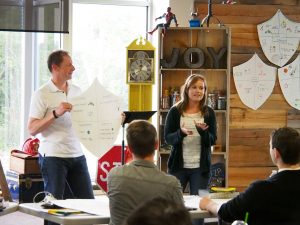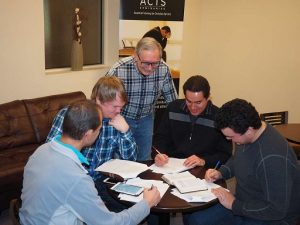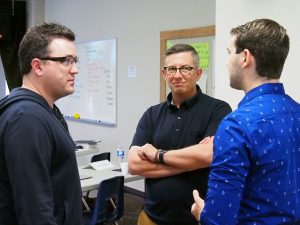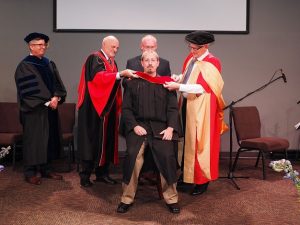Submitted by Northwest Baptist Seminary
As we celebrate our country’s 150th year, many of us have reflected on our national history. One of the lenses through which you can look at the history of Canada is the lens of partnership. Partnerships between diverse communities have helped secure and shape our nation since before it was even founded.
That theme of partnership is also an important one in the history of Northwest Baptist Seminary. The Seminary was born out of a deep partnership with a local group of churches and that partnership continued through a war-related service disruption and multiple relocations. At different times, NBS has also formed strong partnerships with other schools, such as the one we currently share with three other seminaries to form ACTS Seminaries and ACTS’ own partnership with Trinity Western University.
However, it has always been clear to NBS that, without our partnership with our local churches, we would not exist. This fact has perhaps never been clearer than it has over the last few years. In 2010, the leadership of our local group of churches (the Fellowship of Evangelical Baptists in BC and the Yukon – or Fellowship Pacific) approached us to say that our traditional seminary model was not consistently producing graduates who could effectively lead local churches, we knew we had to do something different. Together with Fellowship Pacific, we decided to reverse engineer theological education and create the Immerse program. Beginning with the end in mind will almost always require a dramatic rethink of any institutional structure. And that is certainly true of our Immerse program.

Prospective students share during orientation led by our partner Fellowship Pacific staff
Rather than conferring a degree upon completion of the set amount of credits, Immerse students graduate with their fully accredited Masters of Divinity (M.Div) degree only when they have demonstrated mastery in 27 Ministry Leadership Outcomes crucial to being an effective leader in the church. Rather than having a group of instructors whom you may not know personally, Immerse students are coached through the program by three hands-on mentors: a ministry mentor usually from their local church, an academic mentor representing the Seminary and a network mentor representing the Fellowship. Rather than stepping out of the church for the duration of a degree, Immerse students work entirely within their ministry context for the entire program. Together, these aspects of the program provide mentored mastery in context – ensuring that students grow exactly where they need to, alongside quality, invested mentors, while being involved in effective ministry.

Immerse is driven by mentor-student relationships
Beyond the program itself, this model of theological education ensures that the training of leaders for the church is a true partnership between the seminary, our denomination and local churches.
We are so pleased to have been able to partner meaningfully in the development and launch of the Immerse program with Fellowship Pacific and to be beginning to partner with other regions across Canada as well. The development of Immerse was part of a larger renewing of partnerships between churches in our denomination. Together we committed to experimenting with a focus on working together to leverage our collective strengths. That vision has now been officially implemented as part of our ethos – largely thanks to the success we saw from it of which the Immerse program was no small part.

An Immerse student meets with his academic and ministry mentors
Immerse is also broadening the exposure of our Seminary in the landscape of theological education as it is the first program based off of the Context Based Theological Education (CBTE) model. Every week we receive requests to meet with a new organization wanting to hear more about how they can begin to implement some of what we are doing. Through these contacts, we are beginning to build partnerships with other organizations, not just other Seminaries but church planting networks, Bible translation groups, denominations, Fellows programs and even individual churches.
Not all of these groups are looking to create a graduate degree program, but they are looking to be able to harness the power of mentoring to help develop leaders in their ministry context. To date we have formal partnerships with 12 different organizations and are seeing the pace of new partnerships grow exponentially as we seek to serve the larger body of Christ through these new partners.

Graduation ceremony for the first ever graduate from a context-based theological education program in North America
Last year, we graduated our first student through the program. By September, we anticipate we will have graduated 12 students in 3 different countries with that number quickly rising as our other partners begin to bring students to graduation as well. To date, each of these early graduates have already found full-time roles in local places of ministry, showing that the program is succeeding at producing high-quality graduates who are able to lead the church and ensuring that the future of our churches will be in good hands.
 This charity has been certified by the Canadian Council of Christian Charities. Charities that display our Seal of Accountability demonstrate ongoing compliance with high standards of financial and organizational integrity. To find out more about this charity or other Certified charities, visit giveconfidently.ca.
This charity has been certified by the Canadian Council of Christian Charities. Charities that display our Seal of Accountability demonstrate ongoing compliance with high standards of financial and organizational integrity. To find out more about this charity or other Certified charities, visit giveconfidently.ca.


